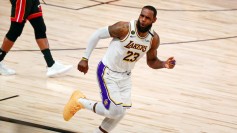Federal prosecutors have charged seven men from Chile in connection with a nationwide burglary spree that targeted the homes of high-profile professional athletes, including Kansas City Chiefs stars Patrick Mahomes and Travis Kelce, according to a criminal complaint unsealed Tuesday. The suspects are accused of stealing more than $2 million in valuables from the residences of multiple sports figures while they were away for games.
The men, ranging in age from 20 to 38, were identified as members of a South American theft ring and face charges of conspiracy to commit interstate transportation of stolen property. If convicted, they could serve up to 10 years in prison, the U.S. Attorney's Office for the Middle District of Florida said in its statement.
Prosecutors allege that the group specifically targeted athletes known to be away from home due to their game schedules. Athletes were "away or playing in professional games at the times of the burglaries," the U.S. Attorney's Office said, noting that the suspects employed a pattern of breaking into homes by forcing entry through windows and doors.
The complaint details multiple break-ins over the past several months, including an Oct. 5 and Oct. 7 spree in Kansas City that led to burglaries at the homes of two Chiefs players. Though the victims were not explicitly named, the timeline corresponds with reports of break-ins at the residences of Mahomes and Kelce.
Another high-profile case linked to the group took place on Nov. 2, when thieves broke into the Wisconsin home of Milwaukee Bucks forward Bobby Portis while he was playing in a game. Prosecutors said nearly $1.5 million worth of valuables-including watches, chains, jewelry, designer bags, cash, and a safe-were stolen. A photo included in the complaint shows four of the defendants posing with a safe and stolen goods shortly after the burglary.
The group is also accused of a Dec. 9 break-in at the home of Cincinnati Bengals quarterback Joe Burrow, who was in Arlington, Texas, playing against the Dallas Cowboys at the time. Prosecutors said approximately $300,000 in goods were taken in that burglary. Authorities allege that one of the defendants, Sergio Ortega Cabello, rented the vehicle used in the Ohio crime.
Additional break-ins tied to the group include an Oct. 21 burglary at the home of a Tampa Bay Buccaneers player and a Dec. 20 robbery of a Memphis Grizzlies player's residence while he was at a home game. The complaint states that in the Buccaneers player's case, suspects gained access through a window and stole jewelry, Rolex watches, a Louis Vuitton suitcase, and a firearm worth more than $167,000.
The FBI had warned major U.S. sports leagues last year about an emerging crime trend in which South American theft crews were targeting athletes' homes. The agency has been working with law enforcement across multiple states to track and apprehend those involved.
The seven defendants-Jordan Quiroga Sanchez, 22; Bastian Orellano Morales, 23; Sergio Ortega Cabello, 38; Pablo Zuniga Cartes, 24; Ignacio Zuniga Cartes, 20; Alexander Huiaguil Chavez, 24; and Bastian Jimenez Freraut, 27-were charged following a multi-agency investigation. Prosecutors say four of them-Cabello, Chavez, Morales, and Sanchez-previously pleaded not guilty to related state charges in Ohio.
The case is part of a broader crackdown on international burglary rings that have been operating in the U.S. under what some officials have termed "burglary tourism." Law enforcement agencies have identified similar South American crews carrying out high-value break-ins across affluent neighborhoods, often exploiting visa waiver programs to enter the country legally.
Todd Spitzer, the district attorney of Orange County, California, has previously warned about vulnerabilities in the U.S. Electronic System for Travel Authorization (ESTA), which allows citizens of 42 countries, including Chile, to travel to the U.S. for short stays without a visa. "For the last 18 months, I have been sounding the alarm about a dangerous loophole in the ESTA Visa Waiver program that is being exploited by organized crime rings from Chile to enter the United States unlimited times over a two-year period without background checks," Spitzer said in January. "These criminals aren't coming to the United States to visit Disneyland."




